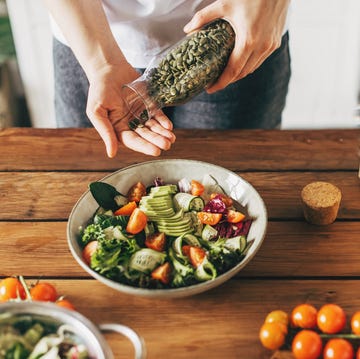19 Top Nutrient-Dense Vegetables to Eat Daily, According to Nutritionists
Fresh, frozen or canned, the more you eat these veggies, the better you'll feel.

Steamed, unseasoned broccoli is no longer the poster child dish of healthy eating. Vegetables have gotten a serious reputation makeover — after all, who can debate their deliciousness when you roast, spiralize, air fry or otherwise transform these plant staples into something flavorful and satisfying?! (We think the answer is: Nobody!) And of course they're not just easy to make tasty, they're also some of the best foods you can eat because they're just so good for you.
"Vegetables are a wonderful part of a healthy diet. They provide an array of nutrients, including my all-time favorite, fiber," says Sue-Ellen Anderson-Haynes, RDN, national spokesperson for the Academy of Nutrition and Dietetics and founder of 360Girls&Women. Besides fiber, eating a variety of veggies also provides antioxidants and key vitamins and minerals that all work together to benefit your overall health and well-being. In fact, countless studies have linked increased veggie intake to decreased risk of chronic disease, including heart disease, diabetes and certain cancers.
But despite their nutritional benefits, many Americans find getting the recommended 2 to 3 cups of vegetables per day to be a challenge. These "more veggies, please" tricks can help:
- Keep a variety of vegetables on hand to prevent boredom and ensure you always have something with which to build a healthy, nutrient-dense meal.
- Stash frozen veggies in the freezer. This can be helpful if it's hard to find fresh produce in your area, and is also a timesaver since they're so easy to prepare. There's no shame in cutting corners here — studies have found that there's not much of a difference in the nutrient content between frozen and fresh vegetables.
- Add vegetables to casseroles, soups, stews and pasta dishes. "This way they get to absorb the flavors going into the meal," says Anderson-Haynes.
- Experiment with including veggies in fresh juices and smoothies as "a quick way to get a serving or more of vegetables at one sitting," Anderson-Haynes says.
- Have some fun by spiralizing veggies and using as a salad base or pasta substitute or add-in. "This is a fun way to consume them for both children and adults," says Anderson-Haynes.
Need some inspiration? While any vegetable is a good vegetable, we've rounded up some of the most nutrient-dense, healthiest vegetables to start adding to your grocery list. Use our nutritionist-approved guide to create healthy plant-based meals and snacks you can enjoy throughout the day. But don't just stick to one type of veggie — choose a variety to bulk up your meals and reap the most benefits. If you want to kick the nutrition up a notch, serve your veggies with an added fat source, such as an oil-based salad dressing, which can help you better absorb certain nutrients.
Stefani (she/her) is a registered dietitian, a NASM-certified personal trainer and the director of the Good Housekeeping Institute Nutrition and Fitness Lab, where she oversees all nutrition and fitness-related content, testing and evaluation. She holds a master’s degree in clinical nutrition from New York University, as well as advanced certifications as a Women's Fitness Specialist and a Behavior Change Specialist. Stefani is dedicated to providing readers with evidence-based content to encourage informed food choices and healthy living. She is an avid CrossFitter and a passionate home cook who loves spending time with her big fit Greek family.


But Wait, Are Sardines Actually Healthy?

Is Rotisserie Chicken Healthy?

What Happened When I Went 2 Weeks Without Meat

These Vegetables Are Surprisingly High In Vitamin C



























